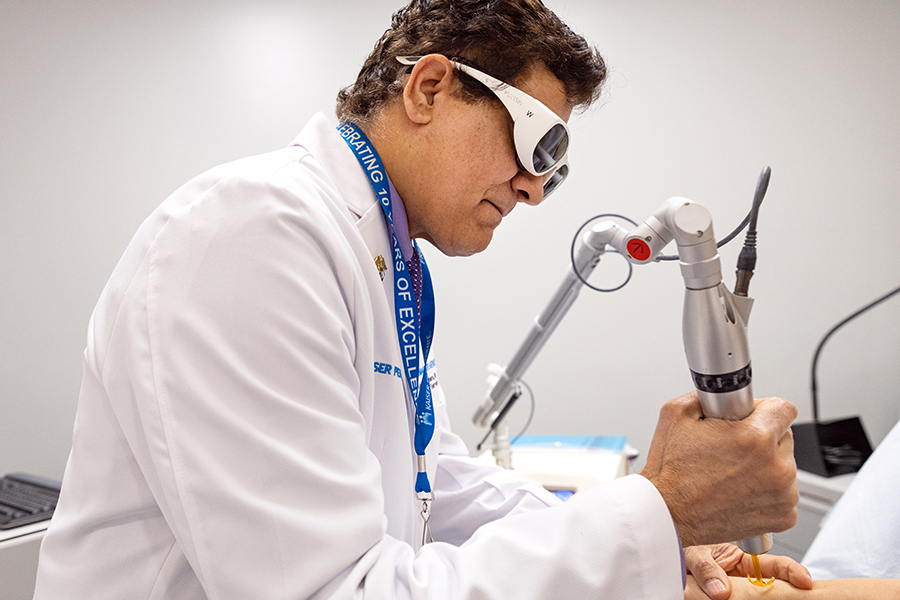April 21, 2022
Kaiser Permanente Northern California program uses advanced practice clinical pharmacists to manage psychiatric medications and integrate care
People living with severe and persistent mental illness such as schizophrenia and bipolar disorder often rely on medication to stave off difficult symptoms that can include psychotic and suicidal thoughts. But side effects and other barriers can make sticking with a drug regimen challenging.

Lisa Fazzolari, DO
Choosing drugs and dosages and adjusting them over time is essential for these patients, said Lisa Fazzolari, DO, a psychiatrist with The Permanente Medical Group. “The psychiatric medications for serious mental illness often have risks to them that can increase over time,” she explained. “And patients are often on multiple medications. It takes a lot of support for patients to continue with all of it.”
An innovative telehealth program at Kaiser Permanente Northern California (KPNC) is expanding support for people with serious, persistent mental illness by adding psychiatric clinical pharmacists to their care teams. The care teams deliver a package of comprehensive care for a highly vulnerable patient population, who are more likely to have chronic conditions such as diabetes and hypertension and a lifespan shortened by 10 to 25 years.

Esti Iturralde, PhD
Dr. Fazzolari and Esti Iturralde, PhD, a research scientist with the Kaiser Permanente Northern California Division of Research, are co-principal investigators on the project. They have written a new paper describing the work in NEJM Catalyst, a publication of the New England Journal of Medicine.
“Schizophrenia and bipolar disorder often develop earlier in life, and these younger patients can struggle with the idea of going on lifelong medication,” Iturralde said. Many of these medications raise risk for obesity, diabetes, and heart disease. “It’s a double-edged sword, because when patients achieve psychiatric stability on their medications they may then have to contend with more metabolic and physical health problems over time,” she added. “They have to balance these 2 forces that are sometimes opposed to one another.”
The collaborative care program uses clinical pharmacists to help patients achieve this balance. The program takes advantage of a growing workforce of clinical pharmacists with 2 years of postgraduate training in psychiatry. Working closely as a team with the patient’s psychiatrist and other clinicians, clinical pharmacists act as care navigators, establishing an ongoing partnership with patients through regular video and telephone appointments.
“The psychiatrists continue to oversee the care of these patients and partner with the clinical pharmacist who can manage the psychotropic medications, monitor labs and blood pressure, and connect members with other population care and preventive health services in our integrated health care system,” Dr. Fazzolari explained.
The program is currently in operation in 8 KP Northern California sites with the goal of serving a population of over 27,000 patients. KP Northern California has also established an in-house postgraduate training program to train more psychiatric clinical pharmacists.
“I wondered if we in psychiatry could use population management with specially trained clinical pharmacists to benefit our patients with serious, persistent mental illness, similar to how we leverage pharmacists in our integrated health care system to manage other chronic conditions such as diabetes and hypertension,” Dr. Fazzolari said.
With a grant from The Permanente Medical Group’s Delivery Science Program, Dr. Fazzolari and Iturralde began studying the impact of the program from its beginnings, comparing a group of 968 participants with a similar group of patients with serious mental illness who are not enrolled in the program.
Early data from the analysis show that these are high-risk patients who could benefit from extra help; 31% had visited an emergency department and 9% had been hospitalized in the previous year. Half had low adherence to psychiatric medications. A quarter had prediabetes and half smoke tobacco.
Iturralde is hopeful that the patients will find value in video visits with the clinical pharmacist; most of those enrolled in the research (87%) completed an intake visit. “I’ve been amazed at how readily the patients are willing to participate, and how well the clinical pharmacists get buy-in and develop trust with both the psychiatrist and the patient,” she said.
The researchers will track the patients over about a year and later report their findings. But Dr. Fazzolari and Iturralde said they wanted to describe their new model and the possibilities it presents sooner, so they wrote the Catalyst article. “We thought it was important to get the concept out into the fields of medicine and psychiatry, that this combination of population management and collaborative care in an integrated health care system can work well for patients with severe and persistent mental illness,” Dr. Fazzolari said.
This article originally appeared in Division of Research Spotlight.






